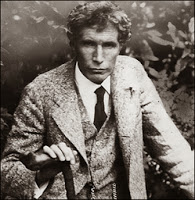
Photographs exist of the famous bookstalls in Farringdon Road, dating from the nineteen forties and fifties, and the one by Moholy-Nagy that illustrates the excellent London Street Markets, was taken in the thirties. But as far as I know, the stalls were never the subject of an etching, of whatever date. Here, dated 1934, is an etching by the brilliantly talented Nathaniel Sparks (1880 – 1956), one of the most popular masters of this art, which of course became moribund almost overnight as a result of the Wall Street Crash.
During the American-led collecting craze, which began just before the First World War, Sparks produced a huge number of etchings, many of them of notable London landmarks such as Westminster Abbey and Tower Bridge, and it is surely a sign of its fame in the thirties that Sparks regarded Farringdon Road as a fit subject for an etching. At that time he was doubtless a customer at the stalls himself, and it is known that in his last sad months, when poverty and illness had him holed up as a lodger in Somerton, he comforted himself by collecting old books. It is also likely that in the last half of a largely peripatetic life, which saw him living with gypsies and farmers in Somerset and the New Forest, he was forced to jettison many of the books he had picked up over the years, in favour of his paints and paper.

Naturally shy, physically slight, and all too aware of the severe rhinophyma which disfigured his face, Sparks sometimes cut a pathetic figure. He could not help compare his ill luck with the fame and fortune that attended his much older cousin, Thomas Hardy, and recorded his resentment in an unpublished satire. Things came to a head in 1940 when an enemy bomb smashed his printing press and he was forced to abandon etching entirely and eke out a living producing pellucid watercolours of scenery in his beloved Somerset.
[R.M.Healey]
The author is grateful for the excellent Nathaniel Sparks Gallery for allowing him to reproduce the two etchings.
Now have proof positive that the etching is of Exmouth Market! (ed.)








